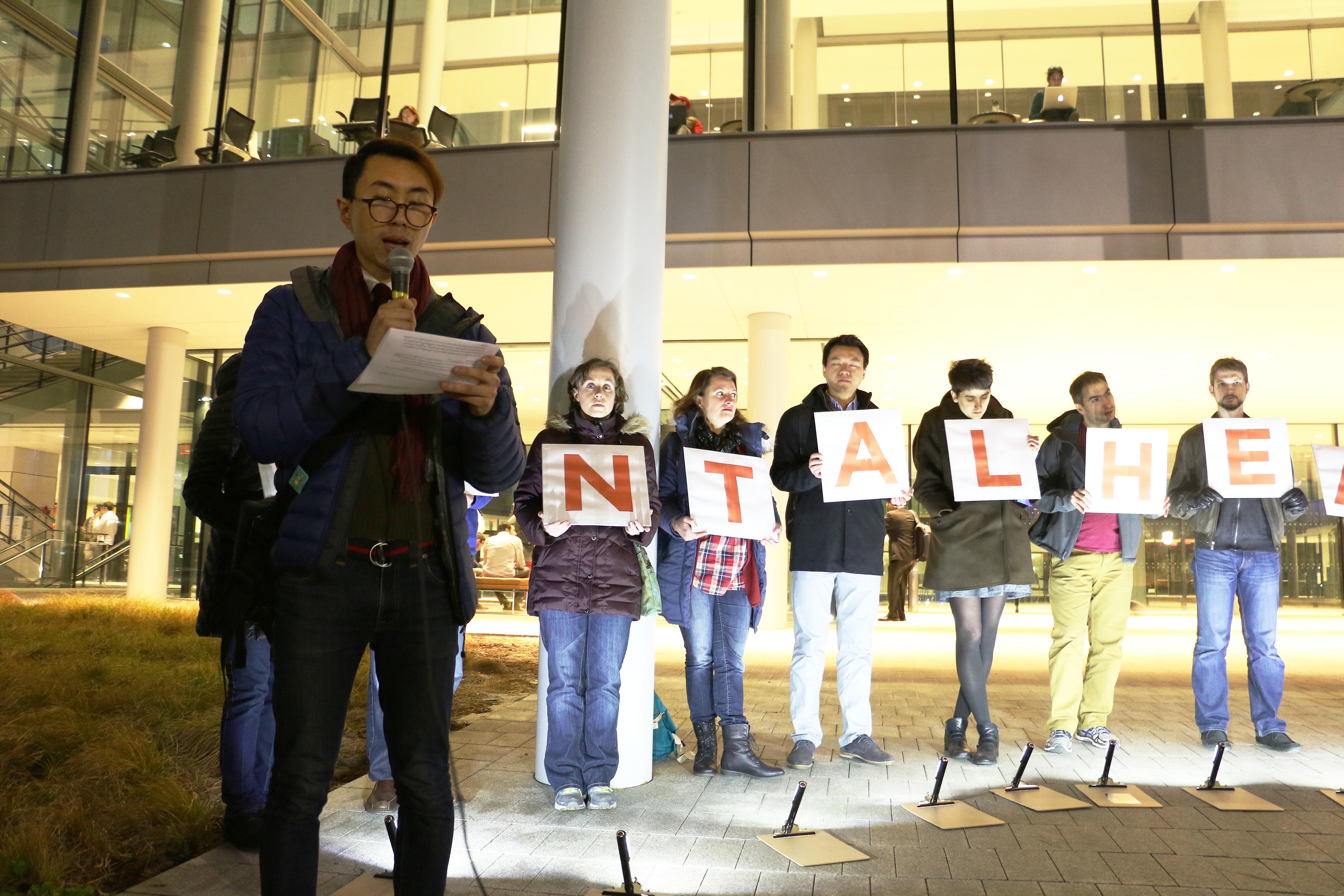
Grant Mao, an international student from Shanghai, China, was at the center of a Graduate Employees and Students Organization rally held on Dec. 8, which called for his reinstatement into the School of Management. Describing his dismissal from the SOM last spring as “unfair,” Mao claimed that the school’s administration had discriminated against him because of his mental illness and nationality. Now, more than a month after the GESO rally, the SOM administration stands firm in its decision to dismiss Mao, even in the face of his potential deportation.
The GESO demonstration took place on the same day the organization submitted two petitions — one addressed to the SOM on Mao’s behalf, and the other calling for general mental health reform. According to a doctor’s diagnosis from the Connecticut Mental Health Center last April, which was included in Mao’s GESO petition, Mao met “criteria for an unspecified depressive disorder,” but during the rally, Mao said the SOM administration did not take his mental health into consideration when deciding on his expulsion.
Mao told the News on Tuesday night that the administration still has not responded to either of GESO’s petitions. Unable to disclose the details of specific student cases without permission, SOM Senior Associate Dean for the MBA Program Anjani Jain also told the News that the SOM had not received permission from Mao to discuss his case publicly as of Tuesday.
The termination of his status as a SOM student meant that Mao’s student visa through Yale expired last spring, though Mao said he has been able to remain in the U.S. ever since through visas granted by other institutions such as the University of New Haven.
“I was discriminated against [because of] my national origin as well as my mental illness,” Mao told the News. “I reached out to the administration for help and I told them about my struggle, but they didn’t do anything and I was ignored.” Instead of finding ways to help him, Mao added, the administration is “trying so hard” to discredit his case.
In a Dec. 8 interview with the News, Mao said his visa from the University of New Haven would expire within the next month, though he would not specify how he obtained that visa, only stating that he has been pursuing “different channels” to stay in the U.S. Mao added that he has reached out to different universities and various politicians — though he would not give details — so he could stay on campus and continue to fight for reinstatement.
Faced with the uncertainty of an administrative response to Mao’s demands of reinstatement, GESO chair Aaron Greenberg GRD ’18 affirmed the organization’s commitment to Mao’s case.
“We are proud to stand with Grant, calling on the University for his reinstatement,” Greenberg said. “We look forward to sitting down with the administration, and we look forward to Grant’s reinstatement.”
Mao was dismissed from the SOM in April because he failed to meet the school’s academic standards. Jain said students in the MBA program take 33 credits in the Core Curriculum during their first year. When a student accumulates below “proficient” grades — meaning that he or she is at the bottom 10 percent of the class — in more than 15 credits, he or she faces dismissal from the school. In December, Mao told the News that he had accumulated 15.5 credits of below “proficient” grades, leading to his expulsion from the SOM.
Mao said he first requested a meeting with the SOM administration in January, during which he spoke about his language difficulties, cultural barriers and family troubles. According to his GESO petition, Mao’s fiancée had broken off their engagement and his mother suffered a heart attack in Shanghai. On Tuesday night, Mao stressed that he made it clear to the administration that he was struggling during the January meeting, though he would not confirm to the News whether he mentioned any specific mental health illnesses at the time.
Last March, when Mao was notified of an imminent dismissal due to his academic standing, he was given a chance to appeal. According to a December article in the Hartford Courant, Mao did not focus on mental health issues in his first appeal letter, attributing his poor academic performance to extracurricular activities and other distractions instead.
“My lack of devotion to coursework and several distractions has led to this disappointing situation,” Mao wrote in his appeal letter, which was provided to the Courant, in early April. The appeal was denied on April 7.
Later that month, Mao was hospitalized for six days and diagnosed with depression by Matthew Gambino, a physician at the Connecticut Mental Health Center. On Tuesday, Mao said the diagnosis makes it “more than clear” that depression had affected his academic performance.
“It appears that his condition [of suffering from depression] developed slowly over the course of the past year,” Gambino wrote in his diagnosis, which was quoted in Mao’s GESO petition. “It is likely that it interfered with his ability to meet the obligations of his coursework.”
Mao was given the chance to submit a second appeal for reinstatement to the SOM administration on May 21. His second appeal was denied on May 28, concluding the school’s formal process for dismissal and reinstatement appeals. Jain emphasized that the SOM gives its final word during the appeal process. After an appeal is denied, students have to go through the regular MBA program admissions process if they want to return to the SOM.
When asked if he knew about the possibility of reapplying and whether he had reapplied through the normal admissions process, Mao said he would rather pursue reinstatement, reiterating that “I deserve to be reinstated.”
Mao’s GESO petition for reinstatement garnered more than 1,000 student signatures, including 250 students from China.







